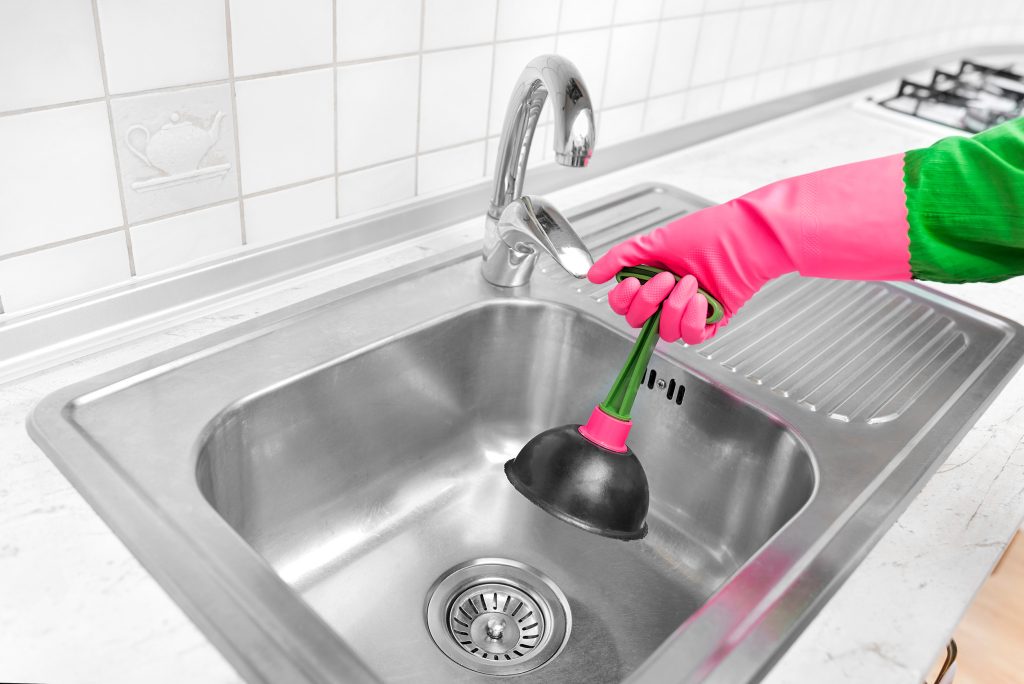Dealing with a clogged drain can be a hassle and, oftentimes, it falls on the man of the house to mend the issue. I can’t tell you how many times my wife calls me into a bathroom or into the kitchen to fix a drain problem. Usually, people resort to using harsh chemicals (like Drain-O) to unclog drains. However, that isn’t 100% necessary. There are plenty of natural, more effective solutions that will help you get things flowing again. Here’s a look at eight simple tricks that will unclog any drain that’s giving you trouble.
1. Boiling Water Flush
One of the simplest ways to clear minor clogs is with boiling water. Heat a large pot of water until it reaches a rolling boil. Carefully pour the hot water directly into the drain in two or three stages, allowing it to work for a few seconds between pours. The heat can dissolve grease, soap scum, and other debris that may be blocking the pipe. This method is most effective for metal pipes but should be used with caution on PVC to avoid damage. If the blockage persists, try combining this method with another trick from the list.
2. Baking Soda and Vinegar Reaction
The combination of baking soda and vinegar creates a natural foaming reaction that helps break down clogs. Pour one cup of baking soda into the drain, followed by one cup of white vinegar. Let the mixture sit for at least 30 minutes while it fizzes and dissolves buildup. Afterward, flush the drain with boiling water to clear out any loosened debris.
3. Plunger Power
A plunger is a classic tool for unclogging drains quickly and effectively. Ensure there’s enough water in the sink or tub to create a tight seal over the drain. Place the plunger over the drain and push down firmly before pulling up quickly to create suction. Repeat this motion multiple times until the blockage is dislodged. A cup plunger works best for sinks, while a flange plunger is ideal for toilets. For better results, try combining plunging with a baking soda and vinegar treatment.
4. Wire Hanger Hook
A simple wire hanger can act as a makeshift drain snake to remove hair and debris. Straighten a wire coat hanger, leaving a small hook at one end. Carefully insert the hooked end into the drain and pull up any gunk that might be causing the clog. This method is especially useful for bathroom sinks and showers where hair buildup is common. After removing debris, run hot water to flush out any remaining particles. Be gentle to avoid scratching or damaging the pipes.
5. Salt and Hot Water Mix
Salt is a great natural abrasive that can help dislodge clogs when used with hot water. Pour about half a cup of table salt down the drain, then slowly add boiling water. Let the mixture sit for a few minutes to break down grease and soap scum. Follow up with more hot water to flush everything away. This method is particularly effective for kitchen sinks clogged with food residue. Repeat as needed to keep your drain clear.
6. Dish Soap and Hot Water for Grease Clogs
Grease clogs can be tough, but dish soap and hot water make a great combination for breaking them down. Squeeze a generous amount of dish soap down the drain, then slowly pour boiling water after it. The soap helps break up greasy residues while the hot water washes them away. This method works well for kitchen sinks where oil and food particles build up. Repeat the process periodically to prevent future clogs. For severe grease blockages, try using baking soda and vinegar before the dish soap treatment.
7. Wet/Dry Vacuum Suction
A wet/dry vacuum can be a powerful tool for unclogging drains. Set the vacuum to liquid mode and create a tight seal over the drain using a towel or rubber adapter. Turn on the vacuum and let it suck out the blockage. This method is effective for removing hair, small objects, and gunk stuck deep in the pipes. Be sure to clean the vacuum filter afterward to prevent odors. If the clog persists, follow up with a baking soda and vinegar rinse.
8. Enzyme-Based Drain Cleaners
Enzyme-based drain cleaners use natural bacteria to break down organic matter without harming pipes. These cleaners are safe for the environment and work well for slow drains caused by hair, food, and soap buildup. Pour the recommended amount into the drain and let it sit overnight for the best results. Rinse with warm water in the morning to clear any remaining debris. Regular use can help maintain clear pipes and prevent blockages. Look for enzyme cleaners at home improvement stores or online retailers.
Keep Your Drains Flowing Naturally
Harsh chemicals are bad for the environment, bad for your plumbing, and bad for you to inhale. You don’t need to use them to get the job done though. There are plenty of ways to use household items to unclog any drain. As with anything else, regular maintenance can go a long way in preventing clogging and other issues.
Read More
8 Terms and Conditions That May End Up Costing You Thousands of Dollars
Loaning Money Is A Mistake Unless You Set These Ground Rules

Drew Blankenship is a former Porsche technician who writes and develops content full-time. He lives in North Carolina, where he enjoys spending time with his wife and two children. While Drew no longer gets his hands dirty modifying Porsches, he still loves motorsport and avidly watches Formula 1.
